UPSC Daily Current Affairs- 21st September 2023 | Current Affairs & Hindu Analysis: Daily, Weekly & Monthly PDF Download
GS-I
Nuakhai Juhar Festival
Subject: History
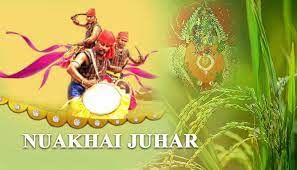
Why in News?
Prime Minister greeted the people on the auspicious occasion of Nuakhai.
- About – Nuakhai is an agrarian festival.
- The word ‘Nua’ means new and ‘Khai’ means food.
- Origin – It originated during the Vedic period where the sages or Rishis used to talk about Panchyajna.
- One among them was Pralambana yajna, which means the cutting of new crops and offering them to mother goddess.
- Regions – The festival is mostly celebrated by the people of Western Odisha and Southern Chhattisgarh.
- It is known as Navakhai Parv in Chhattisgarh.
- Observed on – It is observed in the month of Bhadrapada or Bhadraba (August–September), the day after the Ganesh Chaturthi festival.
- In Odisha, on the occasion, the new rice is offered as Bhog to Goddess Laxmi.
- Nuakhai celebration starts with the preparation for the festival almost two weeks before the festival.
- Nuakhai is understood to have nine colours and as a consequence nine sets of rituals are followed as a prelude to the actual day of celebration.
Source: PIB
Samvatsari (Jainism)
Subject: History
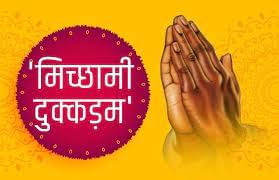
Why in News?
The Prime Minister of India has greeted the people on the occasion of Samvatsari.
About the Samvatsari
- Samvatsari is observed with prayers, rituals, and fasting, and it is a time for Jains to reaffirm their commitment to living a life of non-violence, truth, and righteousness.
- It is a day of reflection, atonement, and reconciliation within the Jain community
- It marks the conclusion of the Paryushan festival, one of the most important annual events in Jainism, which lasts for eight days among the Shwetambars and ten days among the Digambars.
- Shwetambar Jains seek forgiveness for their past wrongdoings, bad karma, and any mistakes made during rituals or interactions with others, which is believed to lead to personal growth, making individuals more humble and compassionate in their interactions with others.
- Jains commonly say ‘Michami Dukkadam’ to all their loved ones and genuinely seek forgiveness from them during Samvatsari.
Here’s how it is celebrated:
- Jains begin the day with prayers and meditation, and visiting the temples to seek the blessings of their revered Tirthankaras (spiritual teachers).
- Temples often display the image of Lord Mahavira, the 24th Tirthankara and the founder of Jainism, as the focal point of veneration.
- Jains engage in a practice known as ‘Pratikramana’ or ‘Pratikraman’ which is a detailed confession of sins committed during the past year.
Source: PIB
GS-II
Constitution Bench to hear challenge to Section 6A of Citizenship Act
Subject: Polity
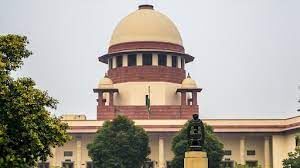
Why in News?
A Constitution Bench has decided to commence hearings regarding a series of petitions that challenge the constitutionality of Section 6A of the Citizenship Act, of 1955.
Background of Section 6A
- Section 6A was introduced as a special provision in the 1955 Act following the signing of the ‘Assam Accord‘ Memorandum of Settlement on August 15, 1985.
- This accord, facilitated by the Rajiv Gandhi government, aimed to protect the cultural, linguistic, and social identity of Assam.
- It marked the end of a six-year-long agitation led by the All Assam Students Union against illegal immigrants, primarily from Bangladesh.
Legal Challenge
- Centre’s Defense: The Union government has maintained that Section 6A is legally sound and urged the court to dismiss the petitions. These petitions were filed nearly 40 years after the enactment of Section 6A.
- Provisions of Section 6A: Under Section 6A, foreigners who entered Assam before January 1, 1966, and were “ordinarily resident” in the State, were granted all the rights and obligations of Indian citizens. Those who arrived in the State between January 1, 1966, and March 25, 1971, were accorded similar rights and obligations but could not vote for a period of 10 years.
- Challenging Discrimination: Petitioners, including Assam Public Works and others, argue that Section 6A’s “discriminatory” nature in granting citizenship to immigrants, especially illegal ones, is in violation of Article 6 of the Constitution, which establishes the cutoff date for granting citizenship to immigrants as July 19, 1948.
Key Points of Contention
- Conservation of Cultural Rights: The Assam Sanmilita Mahasangha, a Guwahati-based civil society organization, has demanded the updating of the National Register of Citizens (NRC) for Assam based on the 1951 NRC rather than the electoral rolls of March 1971.
- Supreme Court’s Involvement: In December 2014, the Supreme Court formulated 13 questions encompassing various issues related to the constitutionality of Section 6A, including its impact on the political rights of Assam’s citizens and whether it violated the rights of the Assamese people to preserve their cultural identity. In 2015, a three-judge Bench referred the case to a Constitution Bench.
Why discuss this?
- The Section 6A case has been pending for several years, coinciding with the Supreme Court’s monitoring of the final Assam NRC list in August 2019, which excluded over 19 lakh individuals.
- Additionally, the past years witnessed the enactment of the contentious Citizenship (Amendment) Act, which granted accelerated citizenship to immigrants from minority communities in Afghanistan, Bangladesh, and Pakistan.
What lies ahead?
- The upcoming hearings on Section 6A will provide a crucial legal examination of its constitutionality and its implications for the protection of cultural rights and the status of immigrants in Assam.
Source: The Hindu
Evolution of “Socialist” and “Secular” in Indian Constitution’s Preamble
Subject: Polity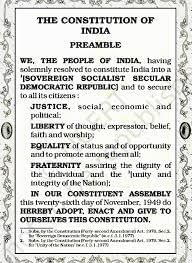
Why in News?
The inclusion of the terms “socialist” and “secular” in the Preamble of the Indian Constitution has recently sparked debate.
- Leader of the a party in Lok Sabha has raised concerns about these words in the Preamble.
Significance of the Preamble
- The Preamble encapsulates the core principles and objectives of the Indian Constitution.
- It serves as an introduction to the Constitution, outlining its fundamental ideals.
Original Preamble
- Content in 1950: The Preamble, when the Constitution came into effect in 1950, did not include the terms “socialist” and “secular.” It reflected the vision and objectives of the Constituent Assembly at that time.
Addition of “Socialist” and “Secular”
- The 42nd Amendment: During the Emergency imposed by Prime Minister Indira Gandhi in 1976, the terms “socialist” and “secular” were added to the Preamble through The Constitution (42nd Amendment) Act, 1976.
- Indira Gandhi’s Agenda: Indira Gandhi’s government aimed to emphasize a socialist and pro-poor image, aligning with slogans such as “garibi hatao” (Eradicate poverty). The addition of “socialist” highlighted socialism as a fundamental goal of the Indian state.
- Distinctive Indian Socialism: The Indian version of socialism did not endorse complete nationalization but emphasized selective nationalization of essential sectors.
Understanding “Secular”
- Religious Diversity: India is home to diverse religious beliefs and practices. The term “secular” was added to the Preamble to promote unity and fraternity among people of various faiths.
- State Neutrality: Secularism in the Indian context implies that the state maintains neutrality and impartiality towards all religions. It does not favor any particular religion as a “state religion.”
- Secularism as Law: Articles 25-28 of the Constitution secure the secular nature of the Indian state.
- Inherent in the Constitution: The philosophy of secularism was inherent in the Constitution even before the 42nd Amendment.
Debates Surrounding “Socialist” and “Secular”
- Consensus on Secularism: The concept of secularism was already part of the Constitution’s philosophy. The insertion of the word “secular” in the Preamble simply made explicit what was implicit in various provisions.
- Constituent Assembly Discussions: The Constituent Assembly debated including these words in the Preamble but decided against it.
- Dr. B. R. Ambedkar’s Perspective: Dr. B. R. Ambedkar argued that issues related to the state’s policy, organization, and economic aspects should be determined by the people, not dictated by the Constitution itself.
- Ongoing Debates: Over the years, there have been petitions and discussions regarding the removal of “socialist” and “secular” from the Preamble. Some argue that these terms were added arbitrarily during the Emergency.
Conclusion
- The presence of “socialist” and “secular” in the Preamble remains a topic of discussion and legal challenges, with differing views on their inclusion and significance in shaping India’s constitutional identity.
Source: Indian Express
Canada needs to see India – not just the diaspora
Subject: International Relations
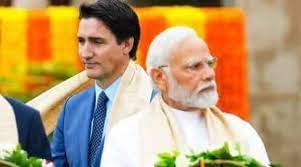
Why in News?
The relationship between Canada and India has hit rock bottom with Prime Minister Justin Trudeau’s accusations of Indian involvement in the death of Khalistan activist Hardeep Singh Nijjar.
Central Idea
- The Canada-India relationship is in trouble after Prime Minister Justin Trudeau’s troubling allegations against India. Diplomats were sent home, and making up seems hard. Both countries need to talk honestly about how some Indian people in Canada are causing problems and making things worse.
The troubling accusations
- Unprecedented Allegations: Prime Minister Justin Trudeau’s statement before Canadian lawmakers, accusing Indian agents of involvement in the killing of Khalistan activist Hardeep Singh Nijjar, represents an unprecedented and game-changing development in Canada-India relations.
- Potential Motivations: The timing of Trudeau’s public announcement in parliament, before fully exploring other options, suggests either the existence of substantial evidence backing the claims or a willingness to jeopardize Canada-India relations for undisclosed reasons.
- Myopic Emphasis on Rule of Law: Trudeau’s emphasis on the rule of law in this context appears narrow, as it fails to consider the broader effects of Nijjar and his separatist associates’ activities in both Canada and India.
- Overlooking Victims: Trudeau’s focus on Khalistan activists’ plight neglects to address the harm they have inflicted, including propagating violence against Indian diplomats, celebrating the death of an Indian prime minister, vandalizing places of worship in Canada, and disregarding Indian lawmaking processes.
Historical Context of Canada-India Relations
- Cold War Cooperation: During the Cold War, Canada and India shared a positive rapport due to their commonwealth status and alignment on UN principles, multilateralism, and global development goals.
- Cold War Disputes: However, differences emerged during the Cold War crises in Korea, Hungary, and Vietnam, straining relations. India’s nuclear program further exacerbated tensions.
- 1980s Rekindling: In the 1980s, increased Indian immigration to Canada sparked renewed interest in India, but trade and security relations remained limited.
- Post-1998 Efforts: After Canada’s rejection of India’s nuclear power status in 1998, significant efforts have been made to revive relations, particularly in trade and investment.
- Toxic Diaspora Politics: The relationship has been consistently hampered by specific diaspora elements within Canada with extremist views who influence Canadian political parties, negatively impacting bilateral ties.
Canada’s Diaspora Politics
- Confounding Deference: Ottawa, particularly under the current government, has consistently displayed a confounding deference to Khalistani groups and other diaspora elements, a characteristic feature of its foreign policy.
- Both Political Parties Implicated: Notably, both major political parties in Canada, namely the Liberals and Conservatives, have been implicated in pandering to diaspora groups that utilize Canadian soil for activities detrimental to other nations’ interests and security.
- Short-Term Electoral Pressure: The influence of diaspora politics has prevented Canadian governments from prioritizing national security and foreign policy objectives over short-term electoral pressures.
- Impeding National Interests: Diaspora politics poses a significant impediment to Canada’s ability to safeguard its national security and foreign policy priorities from the pressures of short-term electoral considerations.
Challenges for India
- Pro-Khalistan Groups: India faces challenges stemming from pro-Khalistan groups within the Indian diaspora in Canada. These groups advocate for the secession of Punjab from India, creating a source of tension between India and Canada.
- Tensions and Resentments: The activities of pro-Khalistan groups in Canada have led to tensions and resentments between India and Canada. The Indian government is concerned about how these groups operate in Canada and their impact on bilateral relations.
- Foreign Policy Dilemma: India must navigate a diplomatic dilemma when dealing with countries like Canada that host diaspora elements supporting separatist movements. Balancing diplomatic relations with such countries while addressing the concerns of these diaspora groups can be challenging.
- Rising Transnational Currents: The rise of transnational currents questions India’s territorial integrity and treatment of ethnic minorities. These currents pose a significant problem for Indian foreign policy, potentially influencing global perceptions and diplomatic relations.
- Online Amplification: The digital age has amplified challenges associated with diaspora politics. Online platforms and social media allow diaspora groups to spread their ideas and mobilize support more effectively, potentially affecting India’s image and diplomacy.
- Caste Discrimination: Caste discrimination is a contentious issue within Indian diaspora communities in Canada and other countries. This adds complexity to India’s engagement with its diaspora and its image abroad.
Way Forward
- Rebuilding Trust: The strained Canada-India relationship calls for a concerted effort to rebuild trust, acknowledging that distrust has deep historical roots.
- Shared Interests: Both countries have shared interests in defending the international order, balancing China’s rise, and cooperating on critical global issues such as climate change, global health, digital technology misuse, artificial intelligence regulation, and support for developing countries.
- Addressing Diaspora Challenges: To effectively address these challenges, a political consensus is required that addresses both countries’ perspectives on Canada’s Indian diaspora and mitigates its worst impulses, particularly those fanning separatist sentiments in India.
- National Interests at the Forefront: The path forward necessitates a clear commitment to prioritize national interests, security, and foreign policy objectives over the pressures of diaspora politics, especially in the era of social media and online activism.
- A Balanced Approach: Striking a balance between leveraging the positive aspects of diaspora contributions and effectively managing the challenges they pose is essential for both countries’ foreign relations.
- Diplomatic Dialogue: Engaging in a sincere, transparent, and multidimensional political dialogue is crucial for both Canada and India. This dialogue should address the role of Canada’s Indian diaspora, its politicization, and its impact on bilateral relations.
- Acknowledging Past Grievances: Recognizing and addressing past grievances and resentments is essential in the journey toward reconciliation and improved relations.
Conclusion
- The strained Canada-India relationship is a result of toxic diaspora politics. To mend this relationship, both countries must engage in a political compact addressing the role of Canada’s Indian diaspora and mitigating its divisive influences, especially those supporting separatism in India. Without this, geographical distance will be overshadowed by deep-seated dispositional differences between Ottawa and Delhi.
Source: Indian Express
GS-III
Green Nudges
Subject: Environment

Why in News?
Study suggests, A ‘green nudge’ cut single-use plastic waste in China,
What are Green Nudges?
- Green nudges are gentle persuasions to influence environment-friendly behaviour in people.
- In behavioural economics, nudges are interventions that influence people’s choices to make certain decisions without restricting the choices available to them.
The Purpose of Green Nudges
- The green nudges were a result of Chinese regulations that prohibited online food delivery platforms from including SUCs in orders unless explicitly requested.
- In early 2020, China announced ambitious plans to phase out single-use plastics from the country, beginning with a country-wide ban on single-use straws by the end of the year.
- plastic bags would first be banned in the major cities, followed by a ban in all cities and towns. China plans to reduce the consumption of single-use plastic items in the restaurant industry by 30%,
Cristsims
- Nudges have been criticised in the past for being manipulative: they are not always transparent and can sometimes bank on ignorance or lack of awareness in people to work.
Recent Research
- A study conducted in collaboration with an online food delivery platform in China found that making “no disposable cutlery” the default choice for orders and rewarding customers with “green points” led to a 648% increase in the share of no-cutlery orders.
- This step could have significant benefits for the environment.
Do Green Nudges Work in India?
- Zomato, an online food delivery platform in India that occupies over 50% of market share in the space, also has similar nudges on its app.
- While the company says that the option to skip cutlery was always available on its platform, it changed the default selection to “no-cutlery” in August 2021.
- “Zomato’s no-cutlery initiative was designed to reduce not just plastic but overall material waste.
Source: The Hindu
Anamudi Shola national park
Subject: Environment
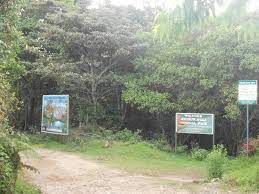
Why in News?
The Pazhathottam area in Anamudi Shola National Park, near Munnar, in Idukki has been transformed into a green heaven teeming with life, by the initiative of the Forest department.
- An eco-development committee named “Haritha Vasantham”was formed for the project, involving local residents in its implementation.
About Anamudi Shola national park:-
- Location: in Devikulam, Idukki, Kerala.
- It is located in the western Ghats.
- The Munnar Wildlife division includes Eravikulam National Park, Chinnar Wildlife Sanctuary, and the Shola National Parks.
- It was declared National Park, in the year 2003.
- It is located in the high ranges of the Southern Western Ghats. (Eravikulam National Park)
- It has the largest Shola Forest patch in South India.
- The Park is contiguous with Anamalai Tiger Reserve, Palani Hills, and the forests of Kannan Devan Hills.
- It also forms the catchment area of Mattupetti Dam and Amaravathi Dam.
- Vegetation: Southern Sub-tropical Hill Forests and Southern Montane Wet Temperate Forests.
- Fauna: mammals, birds, reptiles, amphibians, butterflies, odonates and ants.
- Flora: plant species belonging to Pteridophytes and Angiosperms.
Source: The Hindu
Operation Sajag
Subject: Defence

Why in News?
A Coastal security drill ‘Operation Sajag’ was conducted recently.
Background:-
- It was conducted by the Indian Coast Guard along the West Coast.
- It was conducted by the Indian Coast Guard along the west coast on September 18, 2023.
About Operation Sajag:-
- The day-long drill is conducted every month and the outcomes are further progressed for improvement in the coastal security construct.
- Objective: The drill facilitates revalidation of the coastal security mechanism and brings awareness among the fishermen at sea.
- During the drill, extensive checking and verification of documents and crew passes of all fishing boats, barges, and craft at sea was undertaken.
- A total of 118 ships including those from Customs, Marine Police, Ports & and Indian Navy participated in the drill.
- In order to strengthen the coastal security construct, a slew of measures have been incorporated ranging from:-
- Issuance of Biometric cards for the fishermen.
- Colour coding of fishing boats as per each state.
- Manning of fish landing centres and
- Access control at entry/exit checkpoints.
- Coastal mapping, designating specific marine band frequency for security agencies.
- Training of marine police personnel by the Indian Coast Guard amongst others.
- Besides monitoring of dhows, island security, and community interaction programmes have been institutionalized under the coastal security construct.
Significance:-
- The drill involves a thorough review of various coastal security
- It highlights important lessons and emerging trends in coastal security.
- The drill enables to verification implementation of various coastal security measures besides bringing out important lessons and highlighting trends in coastal security.
Source: PIB
|
52 videos|5374 docs|1136 tests
|
















